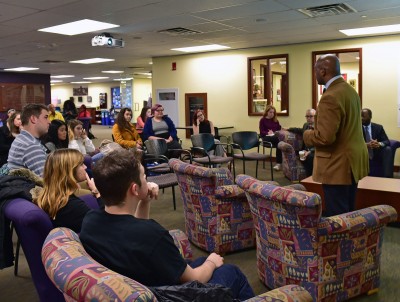
Students voiced concerns of current faculty members’ lack of sensitivity regarding diversity during the Boston University Diversity and Inclusion Task Force’s first open listening session Monday night in the Howard Thurman Center for Common Ground.
Task force co-chairs Gene Jarrett and Stephen Brady presented a short slideshow that detailed the task force’s goals and process. Following the slideshow, they opened the floor to approximately 20 students to begin discussion.
Brady, a professor at the School of Medicine, said meetings like these are recorded and included in reports of the task force’s progress.
“We take notes and we will have synopsis of meetings with students in any final reports we might turn in,” Brady said after the discussion. “It may well be that some of the recommendations we are getting from students will be incorporated into the final recommendations.”
Students’ comments in the listening session focused on faculty training as the key to forging change in the campus community, Brady said. This also gives the task force the responsibility to figure out how to implement such changes.
“There was a consensus that there needs to be training for current faculty at BU, which is about creating a more inclusive environment,” Brady said. “The question is how to do that, which is not something students got into here, but we need to figure out how to do that.”
Students’ worries about diversity on campus are often concentrated on negative experiences with faculty, Brady said.
“Students have concerns that faculty themselves are not always well-educated about … Peers and students sometimes lack sensitivity or awareness of cultural issues,” Brady said. “Also, students desire that diversity should be a part of their curriculum at an undergraduate level.”
BU President Robert Brown and University Provost Jean Morrison announced the establishment of a university-wide task force Aug. 25, 2015 to foster a diverse faculty that mirrors a diverse society and student body. The task force aims to submit a full report to Brown and the university provost on May 1, 2016.
The task force is a university-wide effort, and it has met with members of the administration in several colleges and determined that it will require specialized approaches to support diversity across BU, Brady said.
“There are very unique culture opportunities and challenges among the 17 different schools and colleges,” Brady said. “There’s not a one-size-fits-all model for this, so there needs to be plans for each school or college.”
Brady said listening sessions are just one source of information on students’ concerns to expand efforts for visible diversity on campus.
“There was a climate survey that was done a few years ago with students,” Brady said. “That also informs some of our recommendations for the Charles River Campus, particularly around creating an inclusive environment for current students.”
Several students said though the talk allowed for honest discussion of diversity at BU, they are skeptical of how effective the conversation, and ultimately the task force, will be.
Maya Haynes, a senior in the College of Arts and Sciences, said the discussion was a positive experience in that it allowed her to express her feelings to officials, but she doubted its role in creating real change.
“I’m on the e-board for the Undergraduate Sociology Association, so these issues are close to my heart,” she said. “I knew I had to come. I enjoyed having my voice heard in the conversation, but I have little faith in the conversation.”
Nya-Brielle Earrusso, also a senior in CAS, said the discussion was more blunt regarding the issue of diversity, but she still didn’t believe it would ultimately shape the task force’s work.
“It was refreshing to have the conversation to begin with, and not have the university representatives try to sugarcoat it, so i feel like they were as honest as they could be and were trying to really hear us,” she said. “I don’t really think there’s going to be anything that comes of this.”
Taylor Robinson, a junior in the College of Communication, said she has seen discussions like this one before, and all that matters is tangible change within the university for it to move toward a more open and diverse community.
“I will never be happy with these discussions until there is a policy change,” she said. “We joke that when we go to these discussions, it’s just the same people saying the same things every time.”


















































































































Benjamin Garrison • Feb 23, 2016 at 3:18 am
Boston University is a very diverse school, and already incredibly inclusive. It doesn’t need any more “diversity training” than it already provides; the faculty are just fine as they are. Let’s not go overboard and have the administration waste funds that could be better spent.
Perhaps I’d be more open to the idea if there was some hard explanation as to what exactly are the “lack of awareness” or the “inclusiveness” that’s desired — Some bullet-points to throw around. Are there professors giving bad grades specifically to Latin students? Are the dining hall faculty members giving smaller portions to Asians? This article just leaves me scratching my head.
The only thing I can think of is the “problem” of faculty being apparently “not diverse” enough, as stated in another article. But that could suggest that there are people who believe faculty should be hired based on race/creed/gender, rather than their actual skills and merit. Surely nobody could be THAT silly, right? That would almost be, dare I write, racist.
They want to fix a problem that doesn’t seem to exist.
John Sand • Feb 23, 2016 at 3:59 pm
There is no quantity of nonwhite faculty, no percentage of nonwhite students and no set of ethnic studies programs that will ever stop SJWs from talking about the “great injustice” of a BU education.